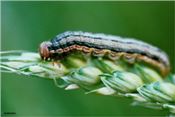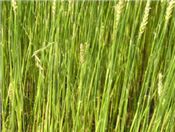True Armyworms Showing Up In Wheat And Pastures
DR. GLENN STUDEBAKER
KEISER, ARK.
We are getting reports of true armyworms in wheat and pastures this week. We do not recommend treating for armyworms in wheat at this time of year unless they are cutting heads or unless the wheat is still in the milk stage. Once the crop reaches the soft dough stage, armyworms do not cause yield loss (unless they are cutting heads). Armyworms tend to hide on the ground under litter during daylight hours and feed on the plant at night. They also feed on the lowest leaves first and work their way up the plant. When scouting, look under clods or dead leaves at the base of plants. Potential yield loss from armyworms depends on the stage of the plant at the time of feeding. Wheat that has reached the soft dough stage (or later) can be completely defoliated with no significant yield loss. Armyworm damage Armyworms feeding on the flag leaf prior to soft dough stage can reduce yields. If defoliation is significant in fields prior to soft dough stage, treatments may be warranted. Refer to the Small Grains section of MP144 Insecticide Recommendations for Arkansas for a list of currently labeled insecticides. The best time to apply an insecticide would be late afternoon since the armyworm feeds primarily at night.
Another concern with armyworms in wheat is the crop that is adjacent to the wheat. Armyworms will often move out of a wheat crop into the adjacent area after the wheat is defoliated. If rice, grain sorghum or corn is nearby, it could be damaged by migrating armyworms. These insects often move quickly and in large numbers and may cause significant defoliation in the adjacent crop seemingly overnight. We have already had a few reports of armyworms moving into, and damaging other crops next to wheat. Any grain sorghum, corn or rice next to wheat should be watched closely for armyworm damage. Insecticide Recommendations for Arkansas (MP144) has a list of currently labeled and recommended insecticides. As in wheat, the best time to apply insecticides is late afternoon or evening.
Some are also having problems with armyworms in pastures. In pastures the treatment threshold is 3 or more armyworms per square foot. As in wheat, the best time to apply an insecticide, if needed, would be later afternoon or early evening because armyworms are more active at night. Growers should also pay attention to any grazing restrictions on the pesticide label before applying an insecticide or allowing cattle to graze after an application. For a list of currently recommended insecticides consult the Forages section of MP144 Insecticide Recommendations for Arkansas. ∆
DR. GLENN STUDEBAKER: Extension Entomologist, University of Arkansas

